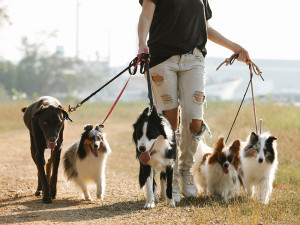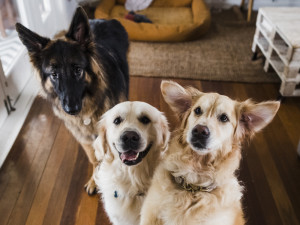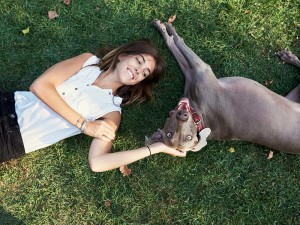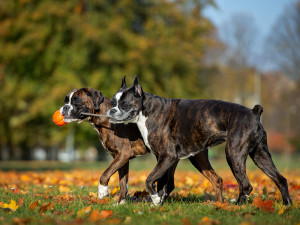7 Ways to Describe Your Dog — Besides “Smart”
According to animal behaviorist Karen London, using a more specific terms like “biddable” or “bombproof” can help you better understand your dog.

share article

Your pet wants you to read our newsletter. (Then give them a treat.)
Obviously, your dog is the cutest, smartest pup on the planet. But here’s the thing: There are lots of other (read: better) ways to describe your dog. In fact, trainers and behaviorists like myself prefer to use more specific words to characterize dogs — terms that are far more useful in understanding them. Because the more specific the description, the more informative it is, which makes it easier to train and build a relationship with your dog. Below, seven ways to describe your dog — beyond “smart.”
1. Biddable
A dog who is biddable is docile, agreeable, and willing to do what you ask. A lot of people want biddable dogs and are happy to have a dog who wants nothing more than to do what they want. Biddable dogs are easy to live with. People without extensive dog-training skills are more likely to successfully train a biddable dog than other types of dogs.
2. Trainable
Dogs who are trainable are often highly engaged with people, curious, eager to try new behaviors, and motivated by good reinforcement — often treatsopens in a new tab. Trainable dogs are able to maintain a high degree of attentiveness and keep their focus. Many people who describe their dogs as smart are actually commenting on how quickly and enthusiastically their dogs learn, which relates to trainability.
3. Soft
A dog who is soft is sensitive in various ways. A soft dog can easily be affected by even the gentlest disapproval, no matter how inadvertently or lovingly it’s expressed. Soft dogs will find even a calm “Oh no!” when they get in the garbage or your dismay at something entirely unrelated to them equally upsetting. Other dogs might barely register your gentle exclamations and won’t change their behavior in any way in response to them. Soft dogs are the ones who suffer most when punished, whether verbally or physically. (To be clear, I don’t use punishment with dogs and strongly advocate against doing so with any dog.)
4. Bombproof
This word is about as far from an official term as you can get, but many trainers and behaviorists use it to describe a dog who is completely imperturbable. Some dogs can tolerate the most amazing array of issues: rude puppies; loud noises, such as a balloon popping or a stack of pots and pans hitting a tile floor; a person picking them up awkwardly or sneaking up on them from behind; children poking them; and even another dog barking, lunging, or snapping at them. Some professionals use their own bombproof dog (if they have one) for working with dog-dog aggression cases because the risk of psychological damage to their own dog is low, even if the other dog doesn’t act appropriately.
5. Galoopy
Pronounced guh-LOOP-ee, this is another informal term making its way into the mainstream. A galoopy dog is an exuberantopens in a new tab, goofy, carefree pup who is very happy and energetic. They tend to leap about and collide merrily with whatever or whoever is around, delighting in anything the moment brings. Such dogs appear to be smiling most of the time, especially in social situations, and may also appear to be moving in multiple directions simultaneously.
6. Persistent
Persistent dogs don’t give up easily, and it can be hard to distract them or divert their attention. Many persistent dogs are excellent problem-solvers because they will keep trying to figure things out until they have a solution. It’s great if your dog is persistent with something you want them to continue doing, like working for the very last bit of peanut butter in a Kongopens in a new tab while you finish answering your email. It’s not so good if a dog is persistent about barkingopens in a new tab, or scratching at the cabinet where you keep their food, hours before their dinner time.
7. Affiliative
While “affiliative” means social in nature, the term is preferred by behavioral biologists because in biology, “social” simply refers to species that live in groups rather than on their own — say, meerkats as opposed to leopards. Affiliative dogs are especially connected and bond strongly. They often seek physical contact and like to be close to other individuals. Affectionate and loving, they sometimes make even people who aren’t all that fond of dogs feel very loved.

Karen B. London, PhD, CAAB, CPDT-KA
Karen B. London, Ph.D., is a Certified Applied Animal Behaviorist and Certified Professional Dog Trainer who specializes in working with dogs with serious behavioral issues, including aggression, and has also trained other animals including cats, birds, snakes, and insects. She writes the animal column for the Arizona Daily Sun and is an Adjunct Professor in the Department of Biological Sciences at Northern Arizona University. She is the author of six books about training and behavior, including her most recent, Treat Everyone Like a Dog: How a Dog Trainer’s World View Can Improve Your Lifeopens in a new tab.
Related articles
![3 dogs posed together in a house]() opens in a new tab
opens in a new tabDoes Your Dog Have a Unique Personality?
Yep, research says your dog is as special and perfect as you tell them they are.
![Woman laying on the grass smiling at her dog]() opens in a new tab
opens in a new tab10 Ways to Make Your Dog’s Life Better
Number 6 will probably surprise you.
![Two boxer dogs playing with a ball together in the park]() opens in a new tab
opens in a new tabDocked Tails Play a Role in Dog Communication
Looks aren’t everything, but they can talk.
![A shy looking dog sitting on a couch.]() opens in a new tab
opens in a new tabSome Dogs Are Scaredy Cats — And That’s OK
Not all fearful dogs have been mistreated.





